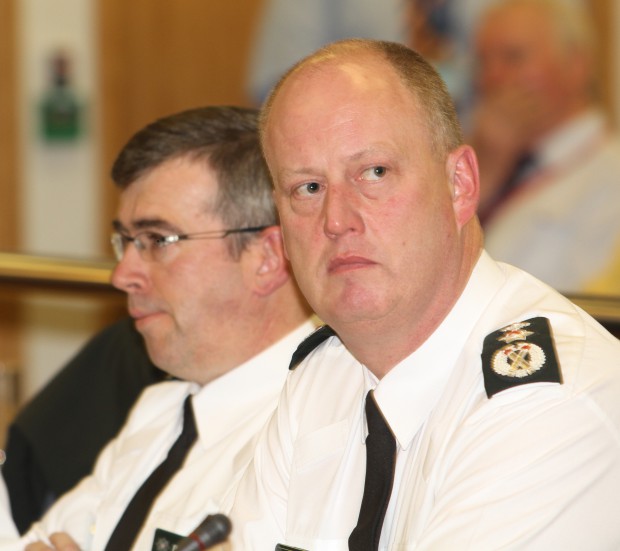3 February 2015
PSNI 'blocked truth' over 'Glenanne Gang' death squad inquiry, High Court told

PSNI Chief Constable George Hamilton
THE PSNI effectively blocked a major report into the actions of a notorious pro-British death squad made of members of the PSNI's predecessor, the Royal Ulster Constabulary, the British Army's Ulster Defence Regiment, and the unionist paramilitary Ulster Volunteer Force, the Belfast High Court was told on Monday 2 February 2015.
In an affidavit, Steve Morris, senior investigator with the Historical Enquiries Team (HET), said his report into the operations of the loyalist Glenanne Gang was “shelved” even though it was 80% complete.
The former Scotland Yard detective was in charge of a special HET unit tasked with investigating the Glenanne Gang.
The disclosure was made in Belfast's High Court as representatives of 13-year-old Patrick Barnard sought a judicial review against Chief Constable George Hamilton over the PSNI's decision to halt the HET inquiry into the gang's activities.
Patrick Barnard was one of four people killed when a bomb exploded at the Hillcrest Bar in Dungannon in March 1976.
In a rare, almost unprecedented, move solicitors for the PSNI Chief Constable did not oppose the application.
Judge Seamus Treacy granted the application for a full High Court hearing which will be heard later.
It has also emerged that Judge Treacy will allow Lethal Allies: British Collusion in Ireland the 2013 book written by former BBC journalist Anne Cadwallader, now a case worker with the Pat Finucane Centre, to be accepted as evidence when the case goes to full hearing.
Using HET reports, Cadwallader documented the activities of the Glenanne Gang made up of some of the North's most vicious loyalist killers as well as members of the British crown forces, including RUC and UDR personnel.
They were involved in as many as 120 killings in what became known as the 'Murder Triangle' of Armagh, east Tyrone and north Louth and Monaghan in the 1970s.
Members of the Glenanne Gang were also central to the planning and execution of the Dublin/Monaghan bombings in 1974 when 33 people were killed in a series of car bomb attacks.
Speaking to AN PHOBLACHT, Mid-Ulster Sinn Féin MP Francie Molloy, who accompanied the relatives to court, welcomed the decision before adding:
“The so-called Glenanne Gang was responsible for more than 100 murders, mainly nationalist civilians, in Counties Armagh and Tyrone as well as being involved in the Dublin/Monaghan bombings.
“The inquiry into the activities of this British murder gang has effectively been closed down.
“The state is once again seeking to delay the truth about the central and pivotal role of its armed forces in running murder gangs over the period of the conflict.
“The campaign of murder waged and directed by members of the British forces against nationalist and Catholic communities has been well-documented.
“It’s unacceptable that the state continues to refuse to take responsibility for its actions and in doing so only adds to the pain and the anguish of the victims.
“Today’s High Court decision is another step exposing the truth about the activities of this murder gang and compel the British Government to take responsibility for the actions of its forces.”
Follow us on Facebook
An Phoblacht on Twitter
Uncomfortable Conversations

An initiative for dialogue
for reconciliation
— — — — — — —
Contributions from key figures in the churches, academia and wider civic society as well as senior republican figures





